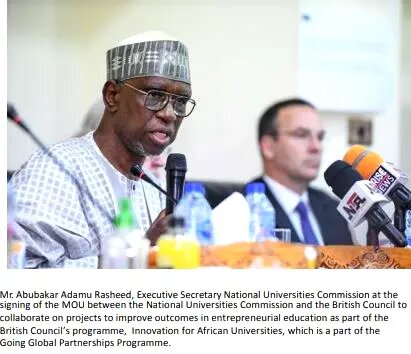Twenty Nigerian institutions to receive a £600,000 grant from the United Kingdom.
This came as Nigeria and British governments signed a Memorandum of Understanding,MoU, on Transnational Education,TNE, with the aim of boosting transformational education in the country.
Speaking during the apresentation of an overview of Transnational Education in Nigeria by the National Universities Council,NUC, to a High Powered UK Government Delegation on Higher Education on visit to Nigeria,event, British Council Chief Executive, Scott McDonald, explained that the partnership was aimed at opening up more opportunities for young Nigerians willing to study in the United Kingdom both virtually and physically.
Mr McDonald explained that it would also encourage an exchange of educational, scientific and cultural co-operation between Nigeria and the UK, and also help to develop professional standards for ministry officials, teachers and school leaders.
McDonald who stressed the commitment of the British Council to a long term investment in the Nigeria education sector as well as its continued growth, maintained that the relationship between UK and Nigeria was very important, not forgetting, the key role of British Council to that effect.
“Our work connects students, teachers and academics in Nigeria and the UK. It opens up access to international education knowledge, to expertise, and to study opportunities for young Nigerians.
“We want to help internationalise education in Nigeria and the UK – both for the benefit of young Nigerians and for young British people. We do this by giving students opportunities to learn new skills, by establishing research collaborations between academics, and by improving the quality of school leadership and assessment methods,”he said.
Açcording to him,”Learning from each other and exchanging expertise and talent is at the heart of our approach. Together we create mutual understanding and provide sustainable opportunities for people in both countries.”
He further said:”One of our key focus areas in Higher Education is supporting educational and research cooperation – including Transnational Education (TNE) – between Nigeria and the UK, including through standards and quality assurance.

“Through our regional HE programme, Innovation for African Universities (IAU), we have established UK-Nigeria grant funded partnerships worth £600,000, to support systemic change between 20 institutions and organisations. We have also identified opportunities for the further growth of this initiative by working with the Nigerian government.
“IAU was designed and developed by the British Council as part of our Going Global Partnerships programme. It aims to foster the culture of innovation and entrepreneurship within African universities and facilitate the development of skills required to build industries, companies, products and services. Through the IAU platform, the British Council also funds a cohort of six partnerships that host a total of 20 enterprise support organisations and universities.”
UK Government International Education Champion, Sir Steve Smith who noted that some of the educational challenges confronting Nigeria including a teeming population of graduates was same in the UK, noted that Nigeria has been selected amongst five other countries in the world to benefit from the TNE partnership with the UK.
“We do not want to ensure a short term student recruitment, but we want to establish sustainable long term partnerships because we do not have answers to all the problems. We want to share ideas and see how we can work together since we share the same problems.
“We want students in Nigeria to come to the UK, we want leading universities in Nigeria to partner with universities in the UK. We want to start the discussions, understand the landscape of Nigeria on TNE, we want to make sure what we offer in partnership with you delivers the quality you need.”
Executive Secretary of the NUC, Prof. Abubakar Rasheed who noted that the insecurity challenge which was affecting the country’s ability to attract foreign students and staff, was beyond the control of the NUC.
While noting that Nigeria has been able to attract foreign students from over 20 Africa countries through the African Centres of Excellence (ACE) programme, he however stressed that Nigeria was committed to opening up more spaces to attract more foreign students from the world over.
“It will be important to explore means and ways to partner with the Vice Chancellors and development partners to see how we can recruit lecturers who can participate in education delivery without necessarily coming to Nigeria.”
Source- Vanguard





